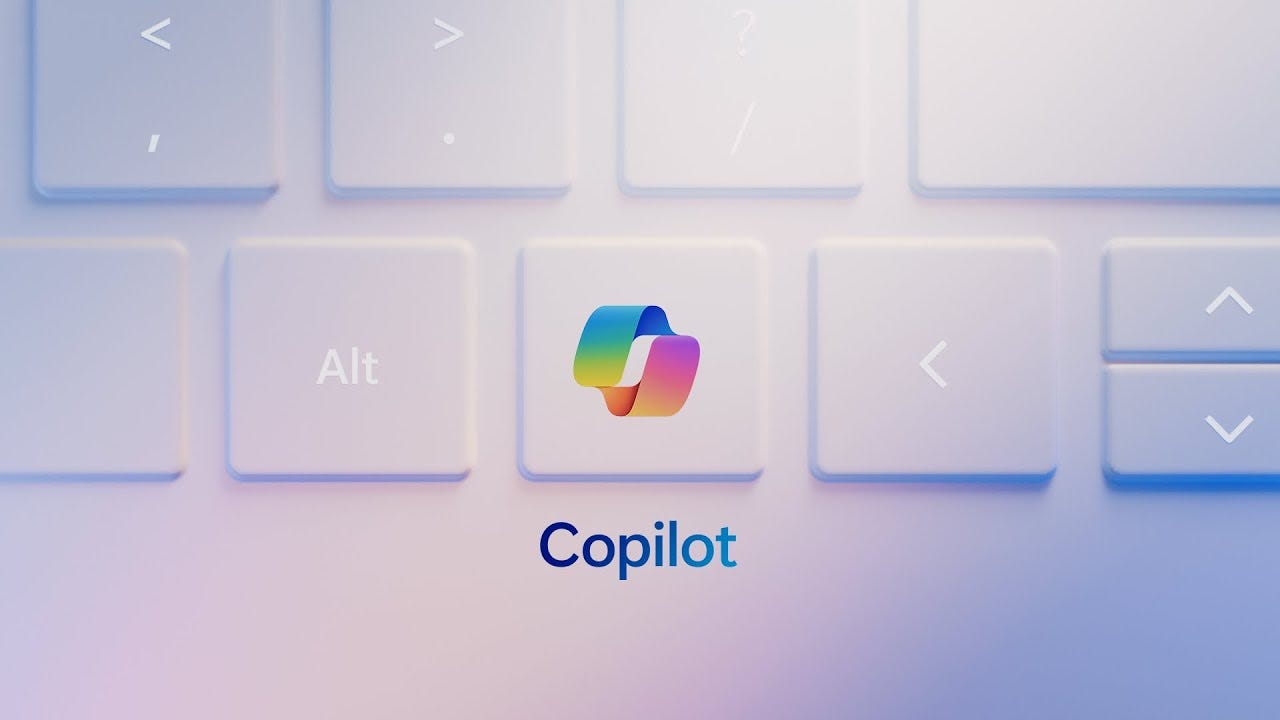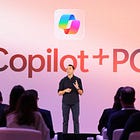Copilot Is the New Internet Explorer
Microsoft’s Copilot is quietly winning the AI wars by owning the entry point. Everyone else is playing catch-up.
Microsoft has embedded Copilot across its stack, making it the de facto AI default for enterprise and desktop users.
OpenAI, Google, and Apple are all racing to define the AI interface, but none have Microsoft’s distribution advantage.
As with browsers, whoever controls the AI homepage will control the future of work, search, and software.
In the 1990s, the internet wasn’t just new, it was up for grabs. Netscape Navigator seemed unstoppable until Microsoft bundled Internet Explorer into every copy of Windows. That quiet distribution move ultimately led to Netscape's demise, triggered a massive antitrust case, and set the blueprint for how platform wars are really won: not by being better, but by being the default.
Now, it’s happening again. Only this time, the battlefield isn’t browsers, it’s AI assistants. While the world fixates on models and benchmarks, Microsoft has been pulling a familiar move in the background: embedding Copilot into every layer of work, development, and infrastructure. This isn’t just a product strategy; it’s a platform conquest. And like Internet Explorer in its prime, Copilot doesn’t need to win your attention. It’s already installed.
History Rhymes
In tech, everything gets unbundled, then re-bundled. And the thing doing the bundling always wins — until it doesn’t.
In the mid-1990s, the internet was raw, chaotic, and wide open. Netscape Navigator was the shiny new gateway, fast, free, and dominant. But then Microsoft stepped in. It bundled Internet Explorer into Windows, flipped the default switch, and erased Netscape from history. It wasn’t about who had the best browser. It was about who owned the entry point.
Fast-forward to 2025, and we’re watching the same playbook unfold, only now, it’s not browsers. It’s AI assistants.
ChatGPT captured lightning in a bottle. OpenAI built the most recognised interface in AI. But while the world obsessed over GPT-4’s IQ, Microsoft quietly built the new Internet Explorer: Copilot. And this time, it’s not just in Windows, it’s in Outlook, Word, Teams, GitHub, and even on the keyboard itself.
The AI platform war isn’t a fight over models; it’s a fight over defaults.
And Microsoft, once again, is setting them.
Copilot Is Already Installed
Microsoft didn’t just partner with OpenAI; it went full 1990s Microsoft and built itself into the stack. While other companies launched splashy demos and quirky devices, Microsoft embedded Copilot into the one thing everyone already uses: work.
Let’s count the layers:
Copilot in Microsoft 365
Word writes for you. Outlook drafts your replies. PowerPoint builds entire decks from notes. And since every enterprise company already pays for these tools, Copilot seamlessly integrates without requiring a single download.
GitHub Copilot: The Developer Entry Point
First mover, deep integration, and sticky. GitHub Copilot became the way devs write code with AI, long before ChatGPT’s Code Interpreter took off. It’s not a tool, it’s an expectation now.
Windows 11 Copilot + Dedicated Keyboard Key
The most Internet Explorer–like move yet: a physical Copilot key is now shipping on new Windows laptops. That’s baked-in, boot-up level access. The AI assistant isn’t an app; it’s the OS.
Copilot in Azure and Microsoft Teams
Azure’s native Copilot support for enterprise ops is quietly making Microsoft the go-to AI infra for CIOs. And in Teams, Copilot summarises meetings, tracks decisions, and offers follow-up actions — all of which happen in the same place where work already happens.
Microsoft didn’t build a separate AI product; it rewired its entire ecosystem around Copilot. In doing so, it avoided the one thing OpenAI still relies on: user intent. Copilot doesn’t need you to open a new tab; it’s already here, already running.
Sound familiar? That’s exactly how Internet Explorer won its first war.
The future of AI won’t be downloaded. It’ll be pre-installed.
Everyone Else Is Playing Catch-Up
While Microsoft quietly turned its AI assistant into the new start menu, the rest of the field is still figuring out where the front door even is.
ChatGPT: The New Netscape
OpenAI built the most elegant AI interface on the planet, but like Netscape in the 90s, it lives outside the OS. It’s a destination, not a default.
Strengths: Brand dominance, cult-like user base, rich GPT ecosystem.
Weakness: You have to go there. Open it. Intend to use it. It’s not woven in yet.
Google Gemini: The Bundled Giant with a Wobbly Rollout
Gemini should have had the pole position: Android, Search, Gmail, YouTube. But its debut was uneven, and its integrations feel reactive.
Now Google is racing to reframe Gemini as your “everywhere AI,” but it’s still battling trust issues from UI fragmentation.
The bundling potential is massive, but as of now, it’s still potential.
Apple Intelligence: The Most Dangerous Late Entrant
If there’s one player that can reset the board with a single software update, it’s Apple.
Siri may be the punchline of AI assistants, but Apple Intelligence’s integration into iOS 18, Photos, Messages, and on-device actions could change that fast.
The catch? It’s limited to M-series chips and newer devices. Apple is betting on premium, not scale.
Meta AI: Present Everywhere, Yet Somehow Nowhere
Meta has quietly rolled out LLaMA-powered AI across WhatsApp, Messenger, and Instagram, a staggering potential user base. But without a compelling agent layer or standalone utility, Meta AI feels like Clippy with more emojis.
The Indies: Perplexity, Poe, Rabbit, Humane
These are the experimental browsers of the AI age: clean, fast, unbundled.
Perplexity is trying to be the Chrome of AI search. Poe is building a model switchboard. Rabbit and Humane want to reinvent the interface altogether.
But they all face the same challenge Netscape did: distribution.
Everyone else is focused on building a better assistant. Microsoft is focused on owning the environment around it.
In tech, better doesn’t always win. Bundled does.
Why Defaults Win (Until Regulators Step In)
There’s a reason the phrase “set as default” feels like a battle cry in tech: because it is.
The AI war is already echoing the 1990s browser saga, where Microsoft didn’t win on merit but on momentum. Internet Explorer wasn’t better than Netscape. But it didn’t have to be; it just had to be installed, launched, and waiting.
History Lesson: Defaults Create Inertia
When Microsoft bundled IE with Windows, usage skyrocketed simply because people didn’t bother to change it. The same thing is happening with Copilot:
Employees aren’t “choosing” Copilot; it’s simply there in Word or Teams.
Developers aren’t comparing LLMs, they’re just coding with GitHub Copilot.
New PCs now have a Copilot key. That’s not convenience; it’s capture.
Inertia is the moat. It doesn’t matter if Copilot is smarter; what matters is that it’s first, easy, and built-in.
But This Is Where the Trouble Starts
Regulators didn’t ignore IE’s rise, and they’re not ignoring Copilot’s either. EU watchdogs and U.S. lawmakers are already signalling interest in how AI assistants are integrated:
The EU’s Digital Markets Act may classify deeply embedded AI assistants as “gatekeepers,” triggering scrutiny.
There’s chatter around API neutrality: Should Microsoft be required to support Claude or Gemini in its Copilot interface?
And there’s the quiet but crucial issue of telemetry and data control: if Copilot sees all your work, who owns that data flow?
In 1998, Microsoft went to court for bundling IE. In 2025, it may go for bundling Copilot.
The Real Strategic Question:
Can Microsoft hold onto the AI default slot without repeating its antitrust mistakes?
It’s a delicate balance; build deep enough to dominate, but open enough to avoid lawsuits. And right now, Microsoft is walking that tightrope better than anyone.
What Comes Next: The Chrome Question
Defaults win — until they don’t. Just ask Internet Explorer.
By 2008, IE had become bloated, buggy, and slow. Google saw an opening and released Chrome: minimalist, fast, and focused. It didn’t come bundled; it earned its way in through design, speed, and relentless iteration. Within five years, Chrome became the browser default, not because it was forced, but because it was chosen.
Which raises the big question for AI today:
Is There a Chrome Moment Coming for AI?
If Copilot is the new IE — functional, embedded, everywhere — who’s building the Chrome of AI?
Perplexity is betting that a faster, cleaner search-native experience can break the ChatGPT/Copilot duopoly.
Poe by Quora is building the first truly multi-model interface — a “meta-browser” for AI, letting you switch between Claude, GPT-4, Gemini, and others in one place.
Open-source agent frameworks like AutoGen or OpenDevin are early whispers of a decentralised, programmable assistant layer.
Startups like Rabbit, Rewind, and Humane are experimenting with entirely new interfaces — wearables, memory-first agents, spatial AI.
What do they all have in common?
They’re not trying to win by owning the assistant. They’re trying to win by redefining the interface.
What Would a Chrome of AI Actually Look Like?
Model-agnostic — not married to one LLM, but switching contextually.
Cross-surface — runs on desktop, mobile, browser, chat, docs, everywhere.
Fast, private, local-first — latency matters more in AI than in search.
Plugin/agent-ready — the equivalent of extensions, but smarter.
But here’s the real kicker: Chrome didn’t beat IE with better bundling — it beat it with better trust. A similar shift could occur in AI.
If users begin to feel that their AI assistant is spying on them, bloated, or steering them toward a company’s own products (hello, Bing), the market could open up quickly.
The Chrome moment for AI won’t be won with models. It’ll be won with trust, design, and speed.
The New AI Homepage
In the browser wars, the homepage was everything. It shaped what you saw first, how you searched, and which ecosystem you lived in. For years, Microsoft forced MSN or Bing as the start page. Google countered with clean, fast loading and instant utility.
Today, the browser is gone, and the AI assistant is the homepage.
You don’t “go” to ChatGPT, Gemini, or Copilot like you used to visit a URL. You invoke them. Speak to them. Let them observe, summarise, and suggest. They come to you, and that makes the stakes even higher.
The Real Platform Isn’t the Model — It’s the Entry Point
Who controls the prompt bar in your OS?
Who surfaces first when you triple-tap the keyboard or speak aloud?
Who lives inside your inbox, your calendar, your computer desktop?
The new homepage isn’t a tab or an app. It’s the first place your intention touches AI. Microsoft is betting that’s inside your productivity suite. Apple thinks it’s on your phone. Google wants it inside search. Meta wants it in your chats. OpenAI wants it… wherever you remember it exists.
The Strategic Truth: Whoever Owns the Homepage, Owns the Ecosystem
The assistant is how you choose tasks, but also how you get nudged toward services, storage, and subscriptions.
It’s the new OS shell. And if you control the shell, you don’t need to win every feature war, just the first click.
The next billion users won’t download their AI. They’ll wake up one morning and realise it was installed while they were sleeping.
That’s the quiet brilliance of Copilot. It didn’t launch. It appeared.
The ultimate winner in the AI era may not be the company that owns the best model or the biggest app, but the one that owns the primary interface through which users manage their digital and physical lives. This represents a fundamental reordering of the tech stack, posing a significant threat to every incumbent.
What to watch: The moment when someone builds the Chrome of AI — fast, clean, model-agnostic, and trusted — will be the next real shift. Until then, don’t watch the models. Watch the defaults.








Great post Josh. This is why Perplexity and OpenAI are releasing their own web browsers - to be the Default